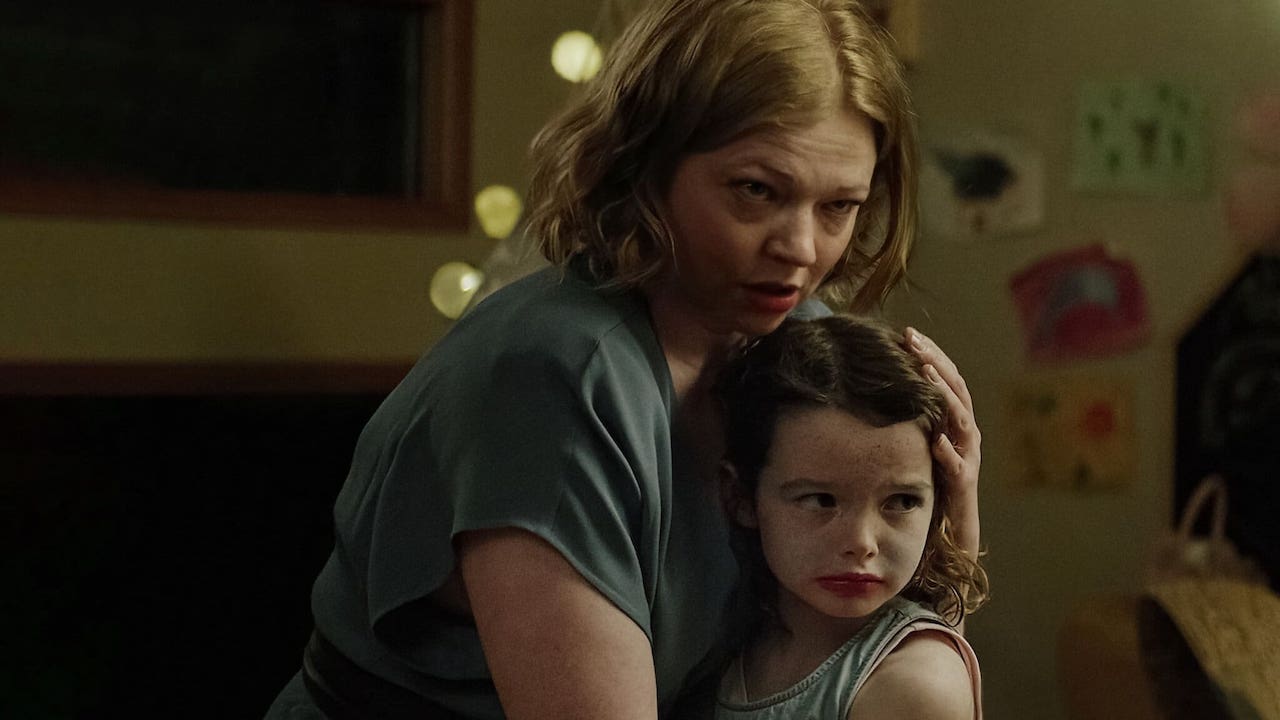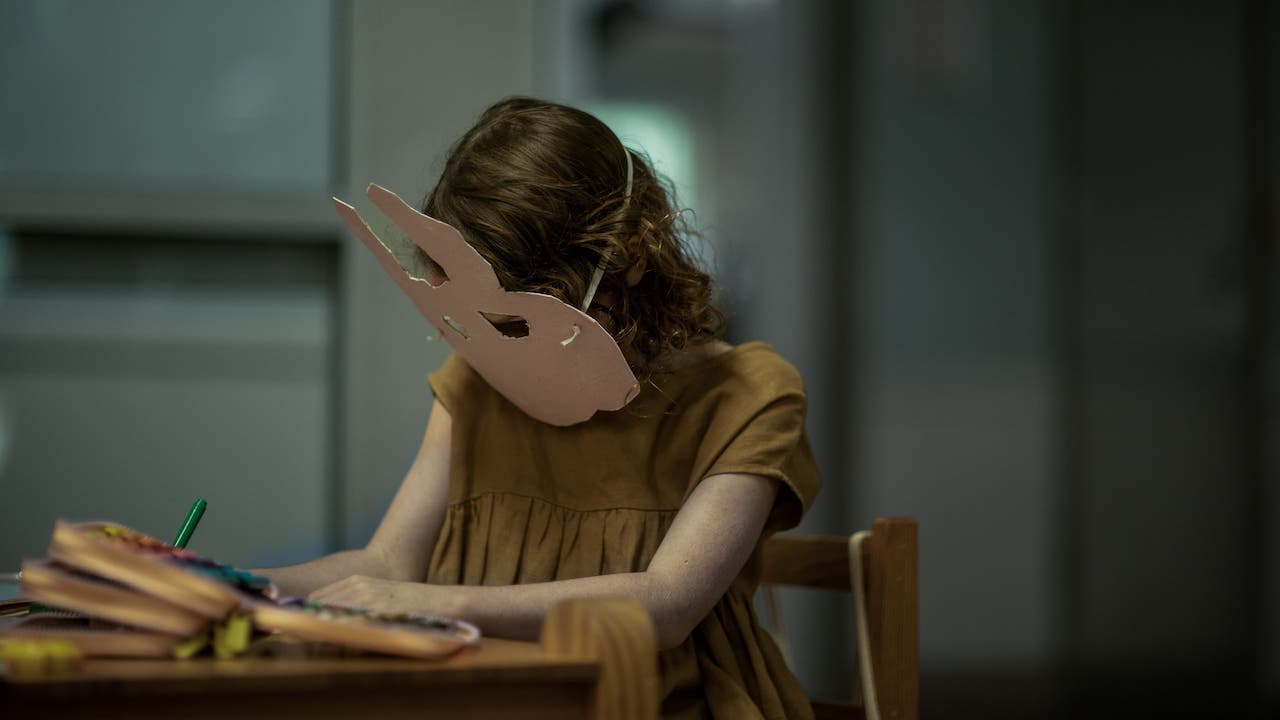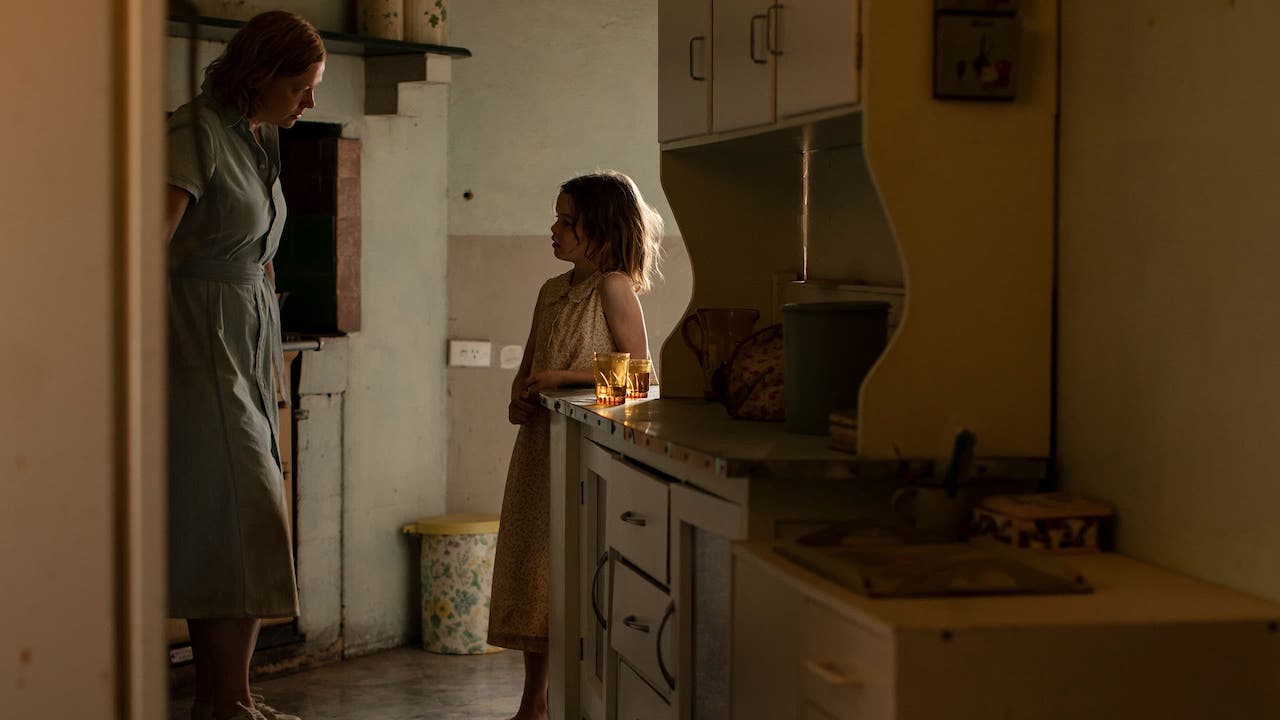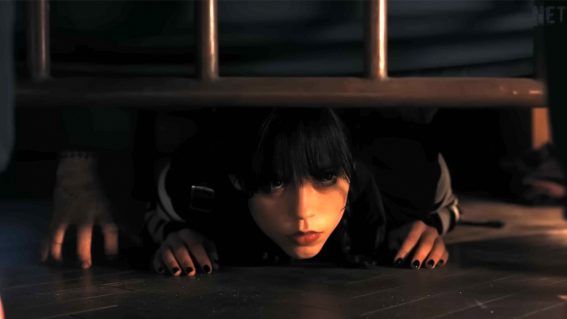Sarah Snook totally carries repetitive horror slog Run Rabbit Run

If you loved The Babadook, you’ll probably be underwhelmed by Run Rabbit Run: a new Aussie horror film on Netflix starring Sarah Snook as a mother re-traumatised by her spooky child. Eliza Janssen expresses her disappointment.
You can totally see why US actress Elisabeth Moss originally signed up to star in Run Rabbit Run. Pulling out of the project in 2021 due to scheduling conflicts, she would nevertheless have been a great fit in yet another role as an emotionally distraught horror survivor, hyperventilating and weeping around southern Australia like she did so successfully in The Invisible Man. The film’s director Daina Reid even earned some Emmy noms for her work on Moss’s best known project, The Handmaid’s Tale.
Unfortunately, you can also totally see why US actress Elisabeth Moss might be relieved to have missed out on starring in this familiar little thriller. Replaced by the tremendous Sarah Snook, fresh off what could very well be an Emmy-winning turn in the final season of Succession, Moss narrowly dodged a dull lead role in another frustratingly subdued slice of “prestige horror”. Just one of Shiv’s frosty, cunning glances is more scary and original than anything Run Rabbit Run has to offer.
Based on a script by celebrated Burial Rites novelist Hannah Kent, it feels, from top-to-bottom, like a horror movie made by people who don’t particularly like horror movies. That’s the only excuse for the film’s inclusion of so many threadbare tropes as if they’re groundbreakingly scary: a bird suddenly thwacking into the protagonist’s car window, spooky drawings by her haunted kid, slo-mo flashbacks to a traumatic past that won’t be unveiled until act three…
The whole thing is a very classy, finely executed affair. Composers Mark Bradshaw and Marcus Whale introduce us to our hero with sawing, menacing strings, and sometimes the unhinged screeching of cockatoos: so far, so good. Sarah (yep, Sarah Snook’s character is called Sarah, something that always tickles my brain in cinema) is a fertility doctor facing grief and isolation from all angles, having recently lost her beloved dad and dealing with her estranged mum’s retirement home care plan.
She’s always reassuring ex Peter (Damon Herriman, underused) and her daughter Mia’s (Lily LaTorre) teachers that “everything’s fine”. Her facade only begins to crack when Mia starts wearing a creepy homemade mask, and insisting that Mum call her “Alice”—the name of Sarah’s sister, who went missing decades ago in some shadowy repressed tragedy.

“Isn’t it a bit hard to miss somebody if you’ve never met them?”, Snook asks, her piercing, hooded eyes often flashing just right in overcast morning light. Her denial and insistence that Mia just drop the whole spooky reincarnated aunt thing suggest an emotive theme that makes Run Rabbit Run interesting, at first. As we grow up and witness hideous things, we harden—and it can take a kid’s wide-eyed, pure perspective to expose the truths that grown-ups are too weak to discuss out loud. But the plot that results, of a parent whose unleashed trauma spills over into what seems like their child’s possession, has already been done so perfectly in superior, also Australian, also female-driven horror film The Babadook. Which is also on Netflix. It’s hard to imagine ever picking Run Rabbit Run for a rewatch over that instant classic, sitting right there in the Recommended For You.
But hold up now, because the derivative genre similarities certainly don’t end there. Sarah’s resentment and grief over both of her parents are distractingly left vague, and they often closely recall the depiction of inherited darkness in Ari Aster’s Hereditary. Particularly when Mia talks about her ailing grandma: “she says she loves me and I belong to her”. Don’t forget the very tonally similar Relic, another Australian jumpscare-fest about women haunting and haunted by their mums and daughters.
The presence of an actual rabbit in the film—quickly adopted a pet/memento mori by Mia— just made me want to revisit the dreamy Aussie film Celia, which also contrasted the fragile, innocent critters with suppressed female rage. Made 34 years ago, it’s a far more striking, unique film. Even a scene of Sarah wrapping herself in her late father’s cardigan, whispering “you’re a good girl” to herself, acts as but a reminder of how great Snook was in Succession, rather than standing on its own as a powerful insight to this character.

Halfway through the film, Sarah and Mia decamp to the home where Alice went missing for no good reason, Sarah’s thematically interesting job as a fertility doc totally abandoned. This is where Run Rabbit Run really goes off the rails, with Snook and talented child actor LaTorre surely needing a physio check-in after carrying the rest of this whole ordeal entirely on their backs. Repetitive scenes of Mia being creepy and Sarah losing the plot quickly wear out their welcome.
They go a little something like this: Sarah wakes up in a darkened room. Shot of bunny, staring. “Mia? Mia, where are you?” Races madly around the house, outside, through the dirt. “MIA!” Strings build-up: Mia appears! Sarah panics, lashes out. “I’m so sorry, mummy didn’t mean to hurt you Mia!” “I’m not Mia!” They fall asleep, covered in dust and tears. Shot of bunny, staring.
That’s pretty much the third act of Run Rabbit Run. One genuinely upsetting moment of Sarah manically jabbing at Mia with scissors comes and goes with less impact than the last 10 maternal freakout scenes. As the film obsessively circles in on a bizarrely abrupt end, it does perhaps achieve some goal of making us empathise with Sarah’s unravelling, as we’re made to feel frenzied and confused while watching. At some point, though, Run Rabbit Run seems like it’s merely punishing its characters (and us), by being both nonsensically monotonous and also too sensible for its own good. Somebody put Sarah Snook in a fun, fresh, gutsy Aussie horror movie please: I wanna see her fight a big crocodile or evil bogans or something.


















